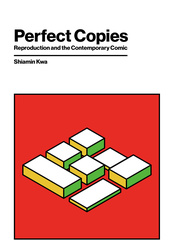
270 pages, 6 x 9
10 color, 50 b-w images
Paperback
Release Date:12 Nov 2021
ISBN:9781978827226
Hardcover
Release Date:12 Nov 2021
ISBN:9781978827769
2022 Eisner Award Winner for Best Academic/Scholarly Work
Japanese comics, commonly known as manga, are a global sensation. Critics, scholars, and everyday readers have often viewed this artform through an Orientalist framework, treating manga as the exotic antithesis to American and European comics. In reality, the history of manga is deeply intertwined with Japan’s avid importation of Western technology and popular culture in the early twentieth century.
Comics and the Origins of Manga reveals how popular U.S. comics characters like Jiggs and Maggie, the Katzenjammer Kids, Felix the Cat, and Popeye achieved immense fame in Japan during the 1920s and 1930s. Modern comics had earlier developed in the United States in response to new technologies like motion pictures and sound recording, which revolutionized visual storytelling by prompting the invention of devices like speed lines and speech balloons. As audiovisual entertainment like movies and record players spread through Japan, comics followed suit. Their immediate popularity quickly encouraged Japanese editors and cartoonists to enthusiastically embrace the foreign medium and make it their own, paving the way for manga as we know it today.
By challenging the conventional wisdom that manga evolved from centuries of prior Japanese art and explaining why manga and other comics around the world share the same origin story, Comics and the Origins of Manga offers a new understanding of this increasingly influential artform.
Japanese comics, commonly known as manga, are a global sensation. Critics, scholars, and everyday readers have often viewed this artform through an Orientalist framework, treating manga as the exotic antithesis to American and European comics. In reality, the history of manga is deeply intertwined with Japan’s avid importation of Western technology and popular culture in the early twentieth century.
Comics and the Origins of Manga reveals how popular U.S. comics characters like Jiggs and Maggie, the Katzenjammer Kids, Felix the Cat, and Popeye achieved immense fame in Japan during the 1920s and 1930s. Modern comics had earlier developed in the United States in response to new technologies like motion pictures and sound recording, which revolutionized visual storytelling by prompting the invention of devices like speed lines and speech balloons. As audiovisual entertainment like movies and record players spread through Japan, comics followed suit. Their immediate popularity quickly encouraged Japanese editors and cartoonists to enthusiastically embrace the foreign medium and make it their own, paving the way for manga as we know it today.
By challenging the conventional wisdom that manga evolved from centuries of prior Japanese art and explaining why manga and other comics around the world share the same origin story, Comics and the Origins of Manga offers a new understanding of this increasingly influential artform.
I have been waiting many years to see something like Eike Exner’s Comics and the Origins of Manga. Modern Japanese comics, or 'manga,' have enjoyed huge success around the world in the last three decades. So much so that today some fans occasionally seem to think manga—perhaps even all comics—are really a purely Japanese invention. Of course, nothing could be further from the truth. In his book, using primary sources from inside and outside Japan, Eike Exner does a wonderful job of cutting through both mist and myths and showing us another reality.
Comics and the Origins of Manga is a fascinating, materialist account of the history shared between the Japanese and Euro-American comics traditions. With the rise of manga as a globally dominant idiom, the prewar development of the form has been of increasing interest to artists and researchers alike. Eike Exner’s thorough, elucidating scholarship tracks this history in an engaging manner in what will undoubtedly be an important English-language reference work on the subject for years to come. Highly recommended.
Eike Exner has meticulously researched voluminous archival materials transnationally, analyzed them critically and carefully, and, in the process, challenged, contradicted, and corrected the history of manga’s origins. Without any reservation, a history-altering masterpiece!
Through subtle formal analysis and groundbreaking archival research, Comics and the Origins of Manga makes a compelling argument for the strong influence of translated American comics on the development of modern Japanese manga.
...a compelling investigation of an historical 'audio-visual' dialogue between the 'sound images' of comics and manga...this text becomes a meaningful revelation of the unique and multifarious histories of world print and comic cultures.
This is an excellent book that I enjoyed reading immensely. The topic is timely and important and the scholarship is meticulous and comprehensive.
New Books Network: New Books in Japanese Studies interview with Eike Exner
Its innovative perspective lies above all in the precision of the documentation and the scrupulous study of the phenomena of translation and borrowing as well as in the history of the narrative and auditory device of the comic strip. For all these reasons, it is a book that stands out for its effects of transmission of both knowledge and sound effects!
Terrific book by Eike Exner - Comics and the Origins of Manga. A brisk-reading but deeply-researched study of the impact American comic strips had on the development of manga in the early decades of the 20th century. New from Rutgers University Press. 'I recommend it.' -me
Really enjoyed this book. Fascinating examination of how early American comic strips influenced the develop of manga than is generally acknowledged. Highly recommended.
'Comics and The Origins of Manga charts the vital influence of US comic strips in Japan (as early as 1908) and to manga creators' incorporating balloons, sound effects and other audiovisual elements inside their panels.
Exner’s work is stunningly rigorous and detailed, surfacing a wealth of examples and specific moments of exchange.
EIKE EXNER is an independent scholar who has taught at the University of Southern California in Los Angeles and Josai International University in Tokyo. His research has appeared in the International Journal of Comic Art, ImageTexT, and The Comics World, and he has received the John A. Lent Award in Comics Studies.
Acknowledgments
A Note on Images
Foreword
Introduction
Prologue: The Historical Origins and Changing Meaning of “Manga” up to 1923
Chapter One: “Popular in Society at Large:” the First Talking Manga
Chapter Two: “Listen Vunce!” The Audiovisual Revolution in Graphic Narrative
Chapter Three: When Krazy Kat Spoke Japanese: Japan’s Massive Importation of Foreign Audiovisual Comics
Chapter Four: From Asō Yutaka to Tezuka Osamu: How Manga Made in Japan Adopted the Form of Audiovisual Comics
Epilogue: The Myth of Manga as a “Traditional Mode of Expression”
Brief Chronology
List of Foreign Comics in Japan 1908-1945
List of Illustrations
Bibliography
Index
A Note on Images
Foreword
Introduction
Prologue: The Historical Origins and Changing Meaning of “Manga” up to 1923
Chapter One: “Popular in Society at Large:” the First Talking Manga
Chapter Two: “Listen Vunce!” The Audiovisual Revolution in Graphic Narrative
Chapter Three: When Krazy Kat Spoke Japanese: Japan’s Massive Importation of Foreign Audiovisual Comics
Chapter Four: From Asō Yutaka to Tezuka Osamu: How Manga Made in Japan Adopted the Form of Audiovisual Comics
Epilogue: The Myth of Manga as a “Traditional Mode of Expression”
Brief Chronology
List of Foreign Comics in Japan 1908-1945
List of Illustrations
Bibliography
Index







